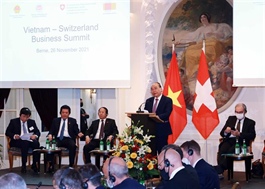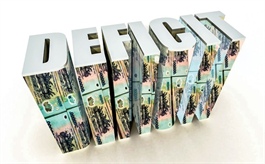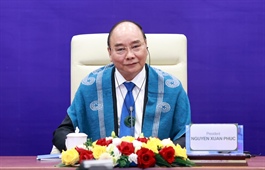Europe and Vietnam build bridges to further bilateral and investment ties
Europe and Vietnam build bridges to further bilateral and investment ties
In a move to help companies and communities rebound after a tumultuous year, Vietnam and Europe are seeking to build stronger connections between businesses and the local government in order to boost the prospects of greater trade and investment.
The European Chamber of Commerce (EuroCham) on November 25 unveiled the “Meet Europe: EU-Vietnam Partnership Post-COVID-19” Whitebook. Unlike the previous publications, the 2021 edition of the Whitebook came during unprecedented times when the country is attempting to emerge from a deadly pandemic in which companies have been closed and citizens have remained at home to stop the spread of the virus.
The publication is a collection of the international and local experience of EuroCham’s 1,200 members in all sectors and industries and from provinces right across Vietnam. Inside, the 18 sector committees share practical, evidence-based, and sector-specific suggestions on how to make their individual industries – and Vietnam’s business environment – more open, more competitive, and more attractive to foreign investment.
The dialogue focuses on three main areas: developing modern healthcare infrastructure and improving access to innovative medicines; resolving current trade issues, focusing in particular on food and beverages as well as agricultural products; and how sustainable economic development can be achieved through green growth, logistics, and digital solutions.
Information about how to foster even greater partnerships between European investors and different regions, especially investment opportunities in each of Vietnam’s provinces, was also included.
With the EU-Vietnam Free Trade Agreement (EVFTA) in force for nearly 18 months, prospects are wider than ever for greater trade and investment between the two. Hence, both overseas and domestic business communities – as well as governments – are being urged to work together to ensure that everybody does not just survive the pandemic, but thrive afterwards.
In light of this, specific concerns among EuroCham members remain the current work permit requirements for foreign workers, which still presents a barrier to bringing the brightest and best workers from around the world to Vietnam. Moreover, European investors continue to struggle to protect and enforce their intellectual property rights, with the pandemic compounding the current backlog of cases.
Meanwhile, several sector committees have raised the issue of counterfeit goods being sold online, urging the government to tackle the spread of fake goods and protect consumers. And with tourism being one of the hardest-hit industries during the pandemic, EuroCham members are encouraging the government to implement a recovery plan to support the sector.
“Our members are not just interested in growing trade and investment – essential though this is – but also in helping to modernise Vietnam’s legal framework, streamline administrative procedures, and improve the business environment, said EuroCham chairman Alain Cany. “Both domestic and international business communities benefit from a more liberal trade and investment climate; not to mention consumers who gain greater access to goods from around the world.”
According to EuroCham, the issues its members raised in the latest edition of the Whitebook are worlds apart from those of the first edition in 2008, when Vietnam had just joined the World Trade Organization. Since then, Vietnam has become more integrated into international markets and global value chains, not least through new-generation trade deals like the EVFTA.
However, Cany said, even though the challenges are different, the solutions remain the same – free, fair, and rules-based trade is the roadmap to recovery from the pandemic. “If the ideas contained in our Whitebook can be taken on board, we believe that it will help the government to go further and faster on its positive path of reform and help Vietnam to continue its unprecedented economic growth into the future.”
In response to the concerns, Vietnamese government agencies are working to solve the difficulties for European businesses. Nguyen Thi Hong, Governor of the State Bank of Vietnam, emphasised that the EU is one of Vietnam’s biggest partners in development cooperation, the fifth-biggest trading partner of Vietnam, and the sixth-biggest foreign investor in the country.
Hong added that the Vietnamese government will continue to create the most possible favourable conditions for EuroCham members to make investments in prioritised sectors like high-tech, IT, the supporting industry, smart agriculture, renewable energy, and environmental protection, among others. Hong also believed that the EU-Vietnam Investment Protection Agreement, once ratified, will deepen bilateral ties.























